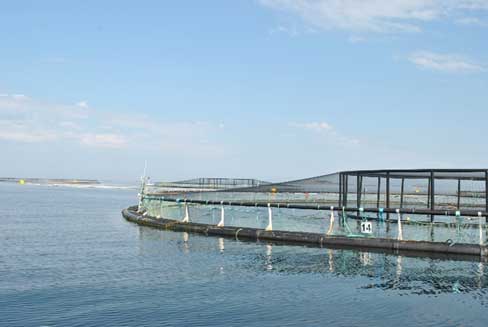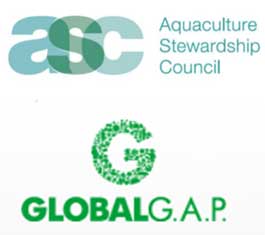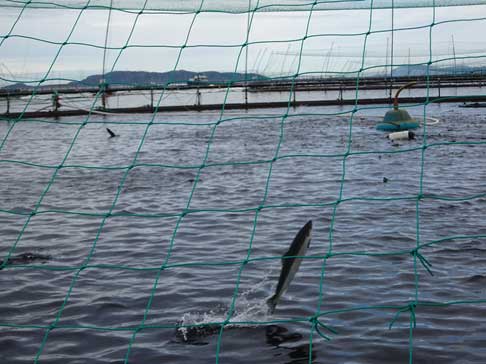Bærekraftige kystsamfunn- Akvakultur/Havbruk - Eksperter i team
Sustainable Coastal Communities
– Making Aquaculture Sustainable
What are sustainable coastal communities? Coastal communities are looking for solutions that create jobs and provide good living conditions, while protecting the local environment and culture. Sustainable solutions in coastal communities consider long-term strategic decisions that solve one challenge without creating more difficult challenges, and also address social, environmental and economic impacts. Students are given the opportunity to tackle current issues with input from business, local and regional authorities and other relevant "stakeholders".
How sustainable is salmon aquaculture? How would we know?
- While many complain that “sustainability” has no real meaning, standards and indicators are being by created by governments and private actors to make the aquaculture industry more sustainable and to measure just how sustainable it is. This village will work with a research project (SUSTAIN FISH) funded by the Norwegian Research Council (NFR) in its work help catalogue, compare and/or analyze these standards and indicators in one or more of these countries: Norway, Chile and Scotland.
- Aquaculture is a major industry in Norway and is growing here and around the world; trends with respect to fishing suggest that further increases in landings of marine fish will have to come from aquaculture. The Norwegian government has adopted a policy to encourage its growth. At the same time, there is a strong debate in many countries as to what impact the industry has on human life and the environment. SUSTAIN FISH and this village will help inform the public debate on what can be a very important but controversial topic.

- «Sustainability» has many aspects. The SUSTAIN FISH project looks at four of these: Environmental, Economic, Governance, and Culture. Understanding the meaning and significance of standards etc. requires expertise in all these areas and more. This is not something that one discipline can do on its own.
Relevant competency:
SUSTAIN FISH brings together political scientists, sociologists, anthropologists, biologists and economists in understanding what sustainability really is, what impacts aquaculture may have, how these may affect sustainability, and how these may be feasibly measured. Standards and indicators are not as straightforward as they seem, and may have different meanings and impacts in different contexts. Achieving sustainability also requires understanding how the industry works, including what technology is available and how it is used. Those with expertise in the industry (biological or otherwise) and business are welcome. SUSTAIN FISH has case studies in 3 countries (Norway, Scotland and Chile). We assume competence in English, but also encourage Norwegian and Spanish speakers to join us.
About the Village
 This village will work with a research project entitled “SUSTAIN FISH” which is funded by the Norwegian Research Council. The goal of that project is to chart the existing web of standards and indicators that exist, to understand how and how well they work and what gaps exist. Are there standards that work at cross-purpose? Can existing standards and indicators be implemented and do they make sense? Do international standards conflict with national ones? Do international standards discriminate against some countries? Standards and indicators come from both public and private sources, including international certification schemes.
This village will work with a research project entitled “SUSTAIN FISH” which is funded by the Norwegian Research Council. The goal of that project is to chart the existing web of standards and indicators that exist, to understand how and how well they work and what gaps exist. Are there standards that work at cross-purpose? Can existing standards and indicators be implemented and do they make sense? Do international standards conflict with national ones? Do international standards discriminate against some countries? Standards and indicators come from both public and private sources, including international certification schemes.
- SUSTAIN FISH is a collaborative effort of scholars from NTNU Social Research/Studio Apertura, NTNU, the Universidad de Talca (Chile), Universidad Andres Bello, the Norwegian Institute for Nature Research, IRIS/University of Stavanger and the Scottish Association for Marine Science. The project has strong links to the aquaculture industry in Trondheim and to the NTNU “bridgehead” project linking NTNU and Hitra and Frøya. These researchers regularly participate in academic conferences and publish together. While no conference is anticipated during the time of this project, students/groups that produce useful work may be invited to join papers and publications presented/published later. Students in this village may work with any of these researchers depending on the project chosen.
- We have specific research needs we hope the village can help us with, as discussed above. However, we also welcome innovative thinking about how to understand how companies understand, interpret and apply standards and indicators and compare effects across countries.
- Sample research questions/projects might include:

- Exploring/evaluating the project’s formulation of sustainability
- Tracking the development the concept through international agreements
- Contributing to the database of standards and indicators by examining government regulations
- Comparing the interpretation, implication or meaning of indicators across countries
- Examining trade-offs among aspects of sustainability
Important information about EiT:
- The focus on teamwork skills and group processes is the unique feature of Experts in Teamwork (EiT)
- EiTs teaching methods depend on the contribution and presence of every participant throughout the semester. For this reason, attendance is compulsory on every village day.
- In contrast to many courses, the first few days are especially important in EiT. During this period, get to know each other and discuss what each individual can contribute. You will also draw up the compulsory cooperation agreement and start preparing a shared research question.
- For additional information about Experts in Teamwork, see page for students
